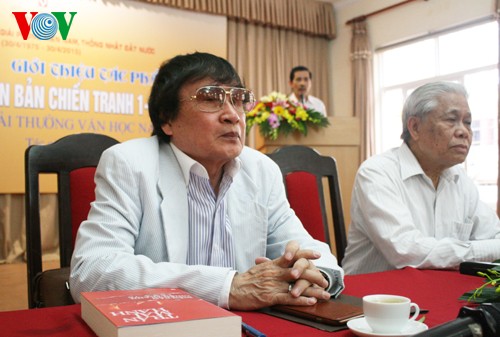(VOVworld) – “War minutes 1-2-3-4.75” is a historical novel by journalist Tran Mai Hanh. Historical stories in the novel recall the pressing atmosphere during the last days of Vietnam’s national resistance war against the American aggressors in 1975. The novel reflects the unbiased view of a journalist and historical witness over a fierce but glorious period in Vietnam’s history
The novel is about the last months of the Nguyen Van Thieu administration in January, February, March, and April, 1975. President of the Vietnam Writers’ Association, Huu Thinh, said Tran Mai Hanh vividly described the situation, portrayed the fates of almost all the leaders and army officials of the Sai Gon puppet regime in the last 4 months of the anti-US war, and highlighted Vietnam's triumphant victory under the leadership of the Communist Party of Vietnam.
As a former war journalist for the Vietnam News Agency in the southern battlefield in 1975, Tran Mai Hanh followed the regular troops to liberate cities and provinces from Hue to Sai Gon. He witnessed the historic event at noon on April 30th, 1975 when the liberation army occupied the Independence Palace, the headquarters of the puppet regime.
Author Tran Mai Hanh said it was historical luck and his lifetime opportunity. “The idea to write a book about this event popped up in my mind in the very first moment of the liberation because every historical event is unique. I wrote down every thing I saw. When I wrote the “Minutes” I swore on my life that I would write the truth. It’s the past but valuable to the present.”
 |
Journalist Tran Mai Hanh (left) at a meeting to introduce his novel
|
Besides writing what he saw, journalist Tran Mai Hanh also managed to access and collect confidential documents from the other side. 40 years after the war ended, Tran Mai Hanh published his 500-page novel. Hanh said 4 decades later were the time for him to have an impartial look again at history.
“I rewrote the book in 2012. If I had published it in 2002, I would have failed because at that time I wrote from the view of the winner. But a decade later I rewrote it differently. Vietnam and the US have normalized relations and become comprehensive partners. With my life experience, I deeply sympathized with and understood the circumstances of the opposite side’s military leaders. Based on the old documents, I rewrote the stories with a different viewpoint.”
Mr. Hanh added 21 documents selected from hundreds of confidential documents he achieved after April 30, 1975: “These 21 documents include 4 telegrams that President Nixon sent to Nguyen Van Thieu in January, 1973 about the signing of the Paris Peace Accord. This telegrams confirmed that Vietnam’s victory was incontrovertible. No matter how the Sai Gon regime tried, it could not continue to rely on the US’s intervention. There are 4 telegrams and diplomatic note that President Gerald Ford sent to Thieu implying that the US wanted to stop its intervention and had to withdraw. The rest consists of the Republic of Vietnam's decisions to accept its failure".
Readers appreciate Hanh for successfully gleaning the most valuable information from the numerous documents. In terms of literature, writer Bui Viet Thang said the novel has applied literary style to portray the characters. “A writer has to find an appropriate style for his novel and readers are considered as marathon runners. Tran Mai Hanh made a good choice with the beginning of the novel. It was after the Phuoc Long victory and the last Christmas of the Republic of Vietnam in December 1974. The gloom somber, mournful atmosphere signaled the collapse of the Republic of Vietnam's administration a few months later.”
The “War Minutes: 1-2-3-4.75” won the Literature Award 2014 of the Vietnam Writers’ Association. For Tran Mai Hanh, the award is a gift of fate that encourages him to continue his writing career.